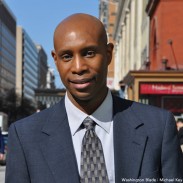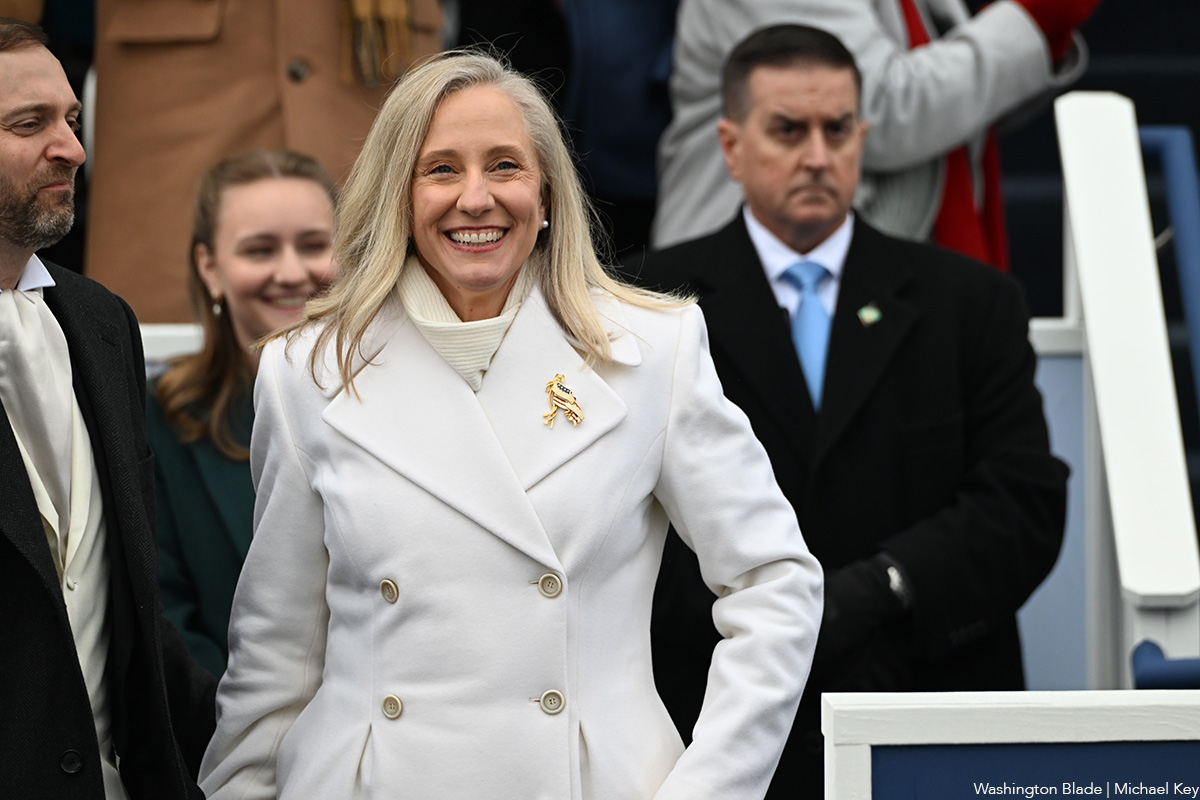Local
Gay couple seeks to block U St. liquor licenses
Nightlife advocates say ban on new bars stifles development


Gay Republican activist Marc Morgan said a moratorium on liquor licenses would hurt economic development in his area. (Washington Blade photo by Michael Key)
Gay former Advisory Neighborhood Commissioner Ramon Estrada and his partner, civic activist Elwyn Ferris, are playing a key role in what many believe will be a heated battle over whether the city should ban all new bars and restaurants with liquor licenses from opening in the rapidly developing 14th and U streets, N.W. corridor.
The recently formed Shaw-Dupont Citizens Alliance, for which Ferris serves as secretary and Estrada is a member, and the lesser known Residential Action Coalition, filed a petition in December with the city’s Alcoholic Beverage Control Board calling for the moratorium.
Gay nightlife advocates, who strongly oppose such a moratorium, acknowledge that the proposal isn’t directed at gay bars or the gay community. But similar to their straight counterparts, they say the proposal would stifle economic development in a vibrant area where large numbers of LGBT people have moved because they embrace the nightlife amenities.
Neither Estrada nor Ferris returned a call from the Blade seeking their views on the issue.
Joan Sterling, president of Shaw-Dupont Citizens Alliance, said Estrada and Ferris are working with her in advocating for the moratorium. She said the moratorium is needed to help reverse what she believes is an alarming rise in crime, parking problems, trash and neighborhood disturbances due to the “over concentration” of liquor serving establishments.
“The issuance of further licenses in the zone would only exacerbate the problems that already affect our neighborhood,” said Sterling, who co-signed the 18-page petition her group and the Residential Action Coalition filed Dec. 10 with the ABC Board.
Opponents of the moratorium have lined up close to 800 people who signed an online petition urging the ABC Board to reject the proposal. Many of them, including gay nightlife advocate Mark Lee, argue that it’s unfair to blame all or most of the crime and other neighborhood problems on bars and restaurants.
They note that existing liquor license moratoriums in Georgetown, Dupont Circle, and Adams Morgan have not curtailed the problems they were supposed to address and, in some instances, resulted in vacant buildings that could have been occupied by restaurants.
“The Logan Circle, U Street and Shaw neighborhoods with large numbers of gay and lesbian residents overwhelmingly support the diverse dining, socializing and entertainment options we enjoy much more than we are willing to tolerate a tiny pseudo citizens group claiming to represent us while pressing for a liquor license moratorium,” Lee told the Blade.
“We don’t want to freeze development in a huge swath of our city with a rapidly growing population,” he said. “We want existing venues to grow and new establishments opening to meet rising demand and attracting other retail businesses…We want to preserve the vibrant community life that caused us to make these areas our home.”
Lee is a regular Blade columnist.
Sterling dismisses these arguments, saying there are 107 existing liquor licenses in the proposed moratorium zone.
“How can anyone claim this won’t remain a vibrant area for bars and restaurants?” she said.
The proposed moratorium would cover a circular area with an 1,800 foot radius, with the middle of the 1200 block of U Street being at the center. Small sections of neighborhoods in Dupont Circle, Logan Circle and Shaw would be covered along with U Street between 15th Street and 8th Street and surrounding streets.
In its northern most point, the area would extend to Clifton Street and its southern boundary would extend to R Street.
Gay ANC Commissioner Alexander Padro, who also serves as executive director of the community group Shaw Main Streets, Inc., said the proposed moratorium’s ban on new restaurants would have a harmful impact on Shaw.
“Restaurants are an important part of the quality of life that residents are seeking and supporting with their dollars,” he told the Blade. “Making it impossible for a newly constructed or newly vacant retail space to house a restaurant or bar could result in a long-term vacancy that would have serious repercussions for the property owner and the community.”
Under provisions of the city’s liquor law, the ABC Board is required to give “great weight” to the views of Advisory Neighborhood Commissions on liquor licensing matters, including a proposed moratorium. Padro’s ANC, ANC 6E; ANC 1B, which covers the 14th and U Street area; ANC 2F of Logan Circle, and 2B of Dupont Circle will all be weighing in on whether or not the moratorium should be approved.
Representatives of each of the four ANCs told the Blade they are currently assessing the views of the residents of their districts on the matter. Matt Raymond, chair of ANC 2F, and Noah Smith, a member of ANC 2B whose district is within the proposed moratorium area, said the four ANCs may hold a joint public hearing on the moratorium proposal in the next month or two.
“If we come to similar conclusions, our great weight will be ever greater with the ABC Board,” Smith said.
Gay Republican activist Marc Morgan, who was re-elected in November to his ANC 1B01 seat, said he too believes a moratorium would hurt businesses and economic development in his ANC area.
“We want to come up with a strong plan to address the problems raised by the advocates for a moratorium,” he said. “I don’t think a moratorium is the best way to address those problems.”
None of the ANC officials contacted by the Blade were willing to predict how their commissions would vote on the moratorium. However, sources familiar with the ANCs impacted by the moratorium have said at least three of the four ANCs are leaning against such a moratorium and would likely vote to oppose it.
If the ABC Board should vote to deny the moratorium petition, the matter would end, according to observers familiar with the process. However, if the board votes to approve it, the D.C. City Council has the authority to make the final decision on the matter.
Gay D.C. City Council member Jim Graham (D-Ward 1), who chairs the committee that oversees liquor licensing matters and in whose ward most of the moratorium zone is located, said he wants to hear from his constituents on the issue before taking a position. Council member Jack Evans (D-Ward 2) feels it is “premature” to weigh in on the issue, according to his communications director Mark Bjorge.
Kathryn Eckles, president of the Residential Action Coalition, told the Blade that although she and her group strongly support the moratorium, the RAC did not hold a meeting to officially vote to file the moratorium petition with the ABC Board.
ABC licensing consultant Andrew Kline, who specializes in liquor licensing and liquor law issues, said the law requires organizations filing a petition seeking a liquor license moratorium to hold a meeting with an advance notice to give all members of the organization an opportunity to vote on the issue.
It couldn’t immediately be determined whether the RAC’s apparent failure to hold a meeting to vote on the issue would disqualify the group from having legal standing to file the petition.
District of Columbia
Capital Stonewall Democrats elect new leaders
LGBTQ political group set to celebrate 50th anniversary

Longtime Democratic Party activists Stevie McCarty and Brad Howard won election last week as president and vice president for administration for the Capital Stonewall Democrats, D.C.’s largest local LGBTQ political organization.
In a Feb. 24 announcement, the group said McCarty and Howard, both of whom are elected DC Advisory Neighborhood Commissioners, ran in a special Capital Stonewall Democrats election to fill the two leadership positions that became vacant when the officers they replaced resigned.
Outgoing President Howard Garrett, who McCarty has replaced, told the Washington Blade he resigned after taking on a new position as chair of the city’s Ward 1 Democratic Committee. The Capital Stonewall Democrats announcement didn’t say who Howard replaced as vice president for administration.
The group’s website shows its other officers include Elizabeth Mitchell as Vice President for Legislative and Political Affairs, and Monica Nemeth as Treasurer. The officer position of secretary is vacant, the website shows.
“As we look toward 2026, the stakes for D.C. and for LGBTQ+ communities have never been clearer,” the group’s statement announcing McCarty and Howard’s election says. “Our 50th anniversary celebration on March 20 and the launch of our D.C. LGBTQ+ Voter’s Guide mark the beginning of a major year for endorsements, organizing, and coalition building,” the statement says.
McCarty said among the organization’s major endeavors will be holding virtual endorsement forums where candidates running for D.C. mayor and the Council will appear and seek the group’s endorsement.
Founded in 1976 as the Gertrude Stein Democratic Club, the organization’s members voted in 2021 to change its name to Capital Stonewall Democrats. McCarty said the 50th anniversary celebration on March 20, in which D.C. Mayor Muriel Bowser and members of the D.C. Council are expected to attend, will be held at the PEPCO Gallery meeting center at 702 8th St., N.W.
Virginia
Va. activists preparing campaign in support of repealing marriage amendment
Referendum about ‘dignity and equal protection under the law’

Virginia voters in November will vote on whether to repeal their state’s constitutional amendment that defines marriage as between a man and a woman.
Democratic Gov. Abigail Spanberger on Feb. 6 signed House Bill 612 into law. It facilitates a referendum for voters to approve the repeal of the 2006 Marshall-Newman Amendment. Although the U.S. Supreme Court’s Obergefell ruling extended marriage rights to same-sex couples across the country in 2014, codifying marriage equality in Virginia’s constitution would protect it in the state in case the decision is overturned.
Maryland voters in 2012 approved Question 6, which upheld the state’s marriage equality law, by a 52-48 percent margin. Same-sex marriage became legal in Maryland on Jan. 1, 2013.
LGBTQ advocacy groups and organizations that oppose marriage equality mounted political campaigns ahead of the referendum.

Equality Virginia has been involved in advancing LGBTQ rights in Virginia since 1989.
Equality Virginia is working under its 501c3 designation in conjunction with Equality Virginia Advocates, which operates under a 501c4 designation, to plan campaigns in support of repealing the Marshall-Newman Amendment.
The two main campaigns on which Equality Virginia will be focused are education and voter mobilization. Reed Williams, the group’s director of digital engagement and narrative, spoke with the Washington Blade about Equality Virginia’s plans ahead of the referendum.
Williams said an organization for a “statewide public education campaign” is currently underway. Williams told the Blade its goal will be “to ensure voters understand what this amendment does and why updating Virginia’s constitution matters for families across the commonwealth.”
The organization is also working on a “robust media and voter mobilization campaign to identify and turn out voters” to repeal Marshall-Newman Amendment. Equality Virginia plans to work with the community members to guarantee voters are getting clear and accurate information regarding the meaning of this vote and its effect on the Virginia LGBTQ community.
“We believe Virginia voters are ready to bring our constitution in line with both the law and the values of fairness and freedom that define our commonwealth,” said Equality Virginia Executive Director Narissa Rahaman. “This referendum is about ensuring loving, committed couples and their families are treated with dignity and equal protection under the law.”
The Human Rights Campaign has also worked closely with Equality Virginia.
“It’s time to get rid of outdated, unconstitutional language and ensure that same sex couples are protected in Virginia,” HRC President Kelley Robinson told the Blade in a statement.
District of Columbia
D.C. police arrest man for burglary at gay bar Spark Social House
Suspect ID’d from images captured by Spark Social House security cameras

D.C. police on Feb. 18 arrested a 63-year-old man “of no fixed address” for allegedly stealing cash from the registers at the gay bar Spark Social House after unlawfully entering the bar at 2009 14th St., N.W., around 12:04 a.m. after it had closed for business, according to a police incident report.
“Later that day officers canvassing for the suspect located him nearby,” a separate police statement says. “63-year-old Tony Jones of no fixed address was arrested and charged with Burglary II,” the statement says.
The police incident report states that the bar’s owner, Nick Tsusaki, told police investigators that the bar’s security cameras captured the image of a man who has frequently visited the bar and was believed to be homeless.
“Once inside, the defendant was observed via the establishment’s security cameras opening the cash register, removing U.S. currency, and placing the currency into the left front pocket of his jacket,” the report says.
Tsusaki told the Washington Blade that he and Spark’s employees have allowed Jones to enter the bar many times since it opened last year to use the bathroom in a gesture of compassion knowing he was homeless. Tsusaki said he is not aware of Jones ever having purchased anything during his visits.
According to Tsusaki, Spark closed for business at around 10:30 p.m. on the night of the incident at which time an employee did not properly lock the front entrance door. He said no employees or customers were present when the security cameras show Jones entering Spark through the front door around 12:04 a.m.
Tsusaki said the security camera images show Jones had been inside Spark for about three hours on the night of the burglary and show him taking cash out of two cash registers. He took a total of $300, Tsusaki said.
When Tsusaki and Spark employees arrived at the bar later in the day and discovered the cash was missing from the registers they immediately called police, Tsusaki told the Blade. Knowing that Jones often hung out along the 2000 block of 14th Street where Spark is located, Tsusaki said he went outside to look for him and saw him across the street and pointed Jones out to police, who then placed him under arrest.
A police arrest affidavit filed in court states that at the time they arrested him police found the stolen cash inside the pocket of the jacket Jones was wearing. It says after taking him into police custody officers found a powdered substance in a Ziploc bag also in Jones’s possession that tested positive for cocaine, resulting in him being charged with cocaine possession in addition to the burglary charge.
D.C. Superior Court records show a judge ordered Jones held in preventive detention at a Feb. 19 presentment hearing. The judge then scheduled a preliminary hearing for the case on Feb. 20, the outcome of which couldn’t immediately be obtained.


















